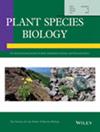在El Pinacate和Gran Desierto de Altar生物圈保护区,墨西哥索诺拉,美洲鳄(Carnegiea gigantea)种群的损害
IF 1.3
4区 生物学
Q4 ECOLOGY
引用次数: 0
摘要
仙人掌是索诺兰沙漠特有的象征性柱状仙人掌,为不同物种提供庇护和食物。气候变化和紫外线暴露的增加正在威胁着这个物种。尽管已经发表了关于美国仙人掌种群“表皮褐变”增加的报告,但据我们所知,还没有关于墨西哥仙人掌种群遭受这种或其他类型损害的研究。本研究是首次在El Pinacate和Gran Desierto de Altar生物圈保护区(墨西哥索诺拉)的仙人掌种群中进行此类研究。对仙人掌茎中的七种损伤类型进行了评估和分类:仙人掌皮层剥落(CCS = 表皮褐变)、环剥、外壳、露根、孔眼、白蚁管和顶部切口。此外,还对健康组织和CCS损伤组织进行了解剖学比较。贝壳是最常见的损伤类型(91%的个体),其次是CCS(73%)。围带现象主要发生在小生物体中。外壳、裸露的根部、眼孔和白蚁管往往更频繁地出现在较大的生物体中,而CCS往往更均匀地分布在不同大小的个体中。在所有个体中,3.3%未受损,89.2%中度受损,7.5%高度受损。CCS损伤导致组织组成和气孔分布的差异,从而损害茎的光合功能。本研究中提供的个体状态快照强调了考虑到仙人掌的长生命周期进行长期研究的必要性,以制定保护策略。本文章由计算机程序翻译,如有差异,请以英文原文为准。

Damage in a saguaro (Carnegiea gigantea) population in the El Pinacate and Gran Desierto de Altar Biosphere Reserve, Sonora, Mexico
The saguaro is an endemic and emblematic columnar cactus of the Sonoran Desert that offers refuge and food to different species. Climate change and increased ultraviolet exposure are threatening this species. Although reports of an increase in “epidermal browning” in saguaro populations in the United States have been published, to the best of our knowledge, no studies of this or other types of damage to Mexican saguaro populations are available. The present research is the first report of its kind performed in a saguaro population in the El Pinacate and Gran Desierto de Altar Biosphere Reserve (Sonora, Mexico). Seven types of damage were evaluated and classified in saguaro stems: cactus cortical scaling (CCS = epidermal browning), girdling, shell, exposed root, eyelet, termite tubes, and topping cuts. In addition, an anatomical comparison of healthy and CCS‐damaged tissues is presented. Shell was the most frequent type of damage (91% of individuals), followed by CCS (73%). Girdling occurred mainly in small organisms. Shell, exposed root, eyelet, and termite tubes tended to occur more frequently in larger organisms, whereas CCS tended to be more evenly distributed among differently sized individuals. Of all individuals, 3.3% were undamaged, 89.2% were moderately damaged, and 7.5% were highly damaged. CCS damage causes differences in the composition of the tissues, as well as in stomata distribution, thus compromising the photosynthetic function of the stem. The snapshot of the state of the individuals provided in the present study highlights the need for longer‐term studies considering the long life cycle of the saguaro to develop conservation strategies.
求助全文
通过发布文献求助,成功后即可免费获取论文全文。
去求助
来源期刊

Plant Species Biology
生物-生态学
CiteScore
2.70
自引率
14.30%
发文量
36
审稿时长
>12 weeks
期刊介绍:
Plant Species Biology is published four times a year by The Society for the Study of Species Biology. Plant Species Biology publishes research manuscripts in the fields of population biology, pollination biology, evolutionary ecology, biosystematics, co-evolution, and any other related fields in biology. In addition to full length papers, the journal also includes short research papers as notes and comments. Invited articles may be accepted or occasion at the request of the Editorial Board. Manuscripts should contain new results of empirical and/or theoretical investigations concerning facts, processes, mechanisms or concepts of evolutionary as well as biological phenomena. Papers that are purely descriptive are not suitable for this journal. Notes & comments of the following contents will not be accepted for publication: Development of DNA markers. The journal is introducing ''Life history monographs of Japanese plant species''. The journal is dedicated to minimizing the time between submission, review and publication and to providing a high quality forum for original research in Plant Species Biology.
 求助内容:
求助内容: 应助结果提醒方式:
应助结果提醒方式:


